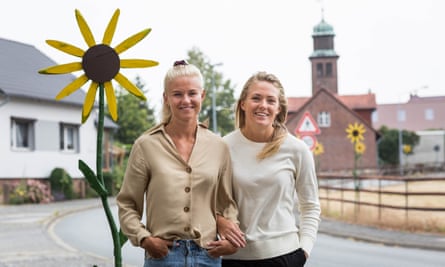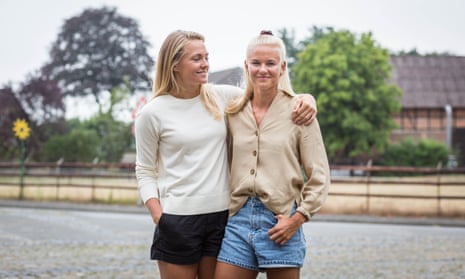It was the most normal thing in the world to Magda Eriksson when, after helping Sweden defeat Canada in the last 16 of the Women’s World Cup, she located her partner in the stands and wandered over towards Parc des Princes crowd. They shared a kiss and thought nothing of it until later on, when the amount of activity on their phones suggested something was blowing up.
“We weren’t even aware anyone was taking a photo,” Eriksson says. But somebody had and the noise on social media had nothing to do with the fact that the girlfriend in question, the Denmark international Pernille Harder, was wearing the shirt of her country’s arch-rivals. The image’s power came from its sheer rarity: a gay, high-profile sporting couple showing their love in public without the slightest abashment. Harder only realised what had happened when her Twitter following suddenly swelled by 3,000; a penny began to drop that something so everyday to both women could be an inspiration to millions.
“It was crazy, the picture was tweeted all over the world – Argentina, Brazil …” Harder is speaking at another familiar scene: the dining table of her apartment just outside Wolfsburg where she is preparing for a fourth season with the serial German champions. Beside her sits Eriksson, the Chelsea defender, who has spent the three weeks of her pre-season break here. Time like this is precious: once the football starts in earnest they may see each other only a couple of days a month. They cannot remember sitting down for an interview together before but their relationship, which they have never hidden since getting together as teammates with the Swedish club Linköping, has taken on a new dimension.
“We’ve always just been natural, not so much thinking of being inspirations together, putting pictures up of each other or anything like that,” Harder says. “But when we saw that photo and the comments around it, then it was really something; like: ‘We’re role models.’ We had messages from a lot of young people, people of our age, but older people also.”
Eriksson came to a similar realisation. “I think that’s when I felt the demand for role models in that way, because of how big it was and how many people wrote to me on Instagram saying they looked up to us and how much we’d helped them. That’s when I understood that we’re really powerful together. Before, we hadn’t really seen ourselves as that.”

That power has been wielded for further good now they have signed up for Common Goal, the movement through which footballers pledge 1% of their earnings to organisations that drive social change. They are the first couple to do so and their donations will be pledged to PlayProud, a global initiative that aims to make team sports a safer and more welcoming environment for youths who identify as LGBTQ+. “We’ve played without privilege and now we are privileged,” Eriksson says. “So now we want to give back to those people who don’t have the same situations we do.”
Among PlayProud’s findings is that more than 40% of LGBTQ+ youth do not believe their communities accept them. Eriksson and Harder grew up in liberal countries but they had different experiences of coming out. Ikast, the Jutland town of 15,000 where Harder was raised, felt “like there were so many traditions” and she did not feel comfortable revealing her sexuality until after she left to play in Sweden seven years ago.
“If I came out in my home town I don’t think anyone would have hated me or anything, but I would have felt a bit alone about it,” Harder says. “It was a bit like being a homosexual in this small place was weird and not normal, and no one was it. When I came into this new environment in Linköping it was totally normal and maybe that helped me to find myself and really realise that I could fall in love with a girl. I think it’s important that environments are open and people can talk about it more. Then everyone can just be themselves.”
Eriksson says it was “definitely easier” to come out in cosmopolitan Stockholm but she still agonised at length before telling those close to her. “I came out a lot earlier than Pernille, but when I think back to it I still had anxiety,” she says. “When I told my friends for the first time I was crying so much, and had so much pressure building up to it, even though I was probably in one of the most accepting environments in the world. So I can imagine how tough it is for people who don’t have the environment I had, because I struggled even though it was really acceptable.”
The time when this kind of conversation could, on record at least, be held with a high-profile male player still looks some way off. An anonymous Twitter user named @FootballerGay, claiming to be a Championship player, stated his intention to come out last month but then reversed the decision, saying he was not strong enough. A handful of individuals, such as the former Leeds winger Robbie Rogers, have done so in the past but the numbers have never been enough to indicate a sea change.
“If you look at the photo from the World Cup and the support we got, imagine what a men’s player would have, it would be massive,” Eriksson says. “But it feels like we have to break the norm before that happens, unfortunately. The men’s game has taken a different turn and it’s very difficult for players to come out. Hopefully when youngsters today grow up, the norm will change.”

Harder thinks male footballers are still “afraid of how fans and teammates will react” but the example of just one courageous individual could change perspectives. The women’s game is setting a standard on this front and in other areas, too. More than half of the 107 players to have signed up for Common Goal so far are women and it is hardly news that their salaries are generally far lower. “I feel we know what it’s like when you’ve come from a lower point,” Eriksson says. “You want to help the younger generation and grassroots build something because of what we’ve gone through.”
Yet there must come a point where the pressures of managing one’s own top-level playing career, acting as a social role model and bearing responsibility for pushing an entire sport forward appear overwhelming. “That’s been the life of a female footballer throughout history,” Eriksson says. “They’ve always had to do more than be footballers. They’ve always had to drive it and get questions that would never be asked of a male player. But hopefully those things will change in time.”
She sensed a shift in the way Sweden were received after finishing third at the World Cup. They lost agonisingly to the Netherlands in their semi-final but beat Germany and, in the third-place play-off, England along the way. Upon arriving home she felt something about the sport’s consumption had fundamentally transformed.
“People were like ‘It was so fun to watch you guys, so entertaining’,” she says. “I’d never heard anyone say they’d genuinely enjoyed watching us before. Previously it was a bit ‘We support you guys …’ but kind of condescending. This time they’d enjoyed it and I was like ‘Ah, this is the point I’d been wanting to reach for so long’. One where people just respect us and don’t think of us as women playing football but just watch the football game.”
Harder’s place among the crowd came after Denmark’s failure to make the tournament, a situation expedited when Eriksson and Sweden defeated the Euro 2017 runners-up in qualifying. She is firmly among the world’s best players; a lethal, exhilarating striker. It was galling to miss out but certainly not an issue that would ever cloud their relationship; she followed Sweden across France, estimating she stayed in nine different hotels during the month.
“I kind of got used to it,” she says of that initially unwanted, but ultimately fulfilling, perspective. “Every time I was at a stadium I was really thinking ‘Women’s football is so cool and fun to watch’. And I think a lot of people who hadn’t seen it before changed their view of it.”
Without ever expecting to, Harder and Eriksson may have altered a few other perspectives too.

Comments (…)
Sign in or create your Guardian account to join the discussion